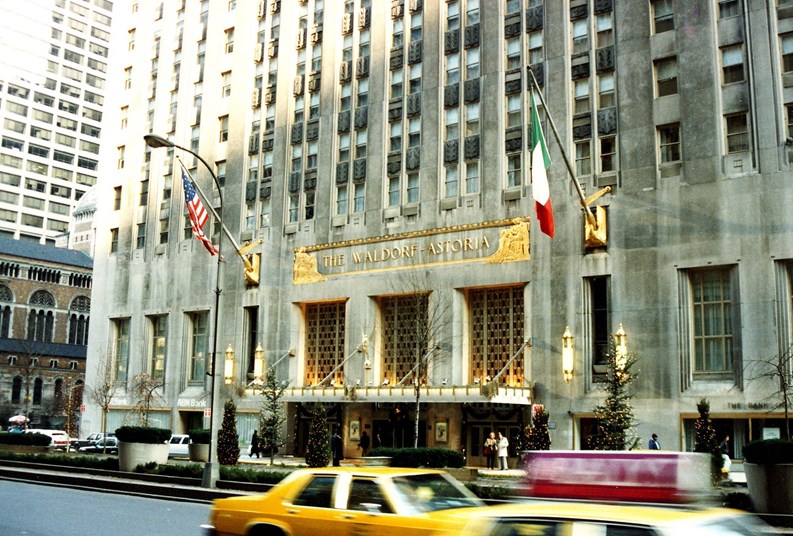A hotel is often viewed as simply a weigh station; a temporary rest stop for the active wanderer. Thus there has always been something fascinating about those who take up permanent residence therein, whether they be Tennessee Williams, Bob Dylan, Marilyn Monroe or Beverly Hills 90210 character Valerie Malone. With the recent news that Anbang Insurance Group, the Chinese company that purchased the Waldorf Astoria, plans to convert up to 1,000 out-of-circulation units in the hotel to condominiums—as reported by E.B. Solomont in The Real Deal late last month—that iconic establishment joins several other luxury properties in the growing mixed-use hotel/residential game. But condominiums and hotels have very different politics in regard to their day-to-day operations, which begs some questions: Who oversees the maintenance of the former? What's the overlap between the two internal structures? What sort of buyer even seeks to purchase a unit within a hotel?
"The management end of hotel/condominium hybrids is actually two-fold," explained Doug Weinstein, vice president of operations at AKAM Associates, Inc., a property management firm in Manhattan. "You'll typically have a master association which oversees the entire structure top-to-bottom. And within that body will exist representation for the residential condominium and the hotel. Where it gets complicated is on the financial end, because certain expenses will be allocated to the residential, others to the hotel, and some will be shared. That's the main function of the master association, to regulate from whence the monies will come. The individual hotel and residential factions will filter payments through the master association, rather than paying directly for what they're responsible."
Separate But Equal
Lest you think that this division is mostly symbolic, there are oftentimes physical separation between the hotel and residential sections of the property. "Much depends on if you have one door or two," notes Marc Kotler, senior vice president of new development consulting and property management with FirstService Residential New York. "Most of these mixed-use hotels have two separate entrances with two staffs serving different types of clients. But there are going to be some shared services, and they will be part of a master budget."
While the service staff—front-of-house attendants, bellhops, concierges, housekeepers, etc.—is mostly relegated to hotel operations, there could be engineering personnel that run shared chiller systems, boilers and HVAC for the entire property, and, according to Kotler, they will be paid based on percentage of ownership. As the hotel tends to occupy a larger portion of the property than does the residential, it will pay a proportionately larger share.
The prices for these apartments are staggering. According to CityRealty, residences at The Plaza, to cite but one of these high-end locales, will cost you around $4,112 per square foot. "From my experience, it's a special kind of person who likes this type of apartment," said Janice Silver, a licensed associate real estate broker with Manhattan-based Stribling & Associates. "You used to watch these old movies where it seemed so elegant to live in hotels. It was celebrities and famous movie stars who couldn't be bothered with taking care of things themselves. It's not families looking to live in hotels; it's usually people who aren't here all of the time, as these owners tend to have other residences as well."
Puttin’ on the Ritz
"The Ritz on 57th and Park has a chef who posts what he's making that night in the elevator each day," Silver continued. "Sure in New York City you can order from a million restaurants online, but it's nice to have a chef to take care of you; it's like having an in-house cook. Some of these properties have people who will take care of your mail, run errands for you... it's similar to a personal assistant. If you're the type of person who even concerns themselves with high maintenance costs, then this isn't for you; you're really paying for a next level of convenience."
But if owners are often either out of town, out of the country, investors, or simply those looking for the finest of luxury services, couldn't one assume that they'd be unlikely to want to sit on a condo board? Silver insists that this is not the case. "Some people rent their apartments out, or buy them as investments, or are only there maybe two days per month,” she said. “Yet others may be purchased with the intention of doing more traveling, and wound up staying in their units more than expected. But oftentimes these people are very involved in the business of ownership and are thus quite concerned with board politics."
"The same type of personalities are on the boards of these buildings as they are in any building," she noted. "I say this as both a broker and someone who's been on her own board for 12 years. It's people who really want to take care of things, who want to protect their investments, and are comfortable running things from a managerial position."
At the end of the day, a lot of what these people are buying into is the brand. Fancy hotels come with their own high-class reputations that can appeal to the upper crust. "At the Baccarat, for example, people are buying condominiums in what they call a 'six-star hotel,' and they're getting the luxury of certain services," said Kotler. "They can walk into the bar or the restaurant and have a house account. There are a lot of benefits from being in that type of building."
Michael Odenthal is a staff writer for The Cooperator and other publications.







Leave a Comment